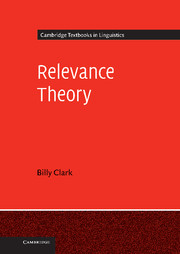Book contents
- Frontmatter
- Contents
- List of Figures and tables
- Preface
- Acknowledgements
- Typographical conventions
- Part I Overview
- 1 A first outline
- 2 Origins and alternatives: Grice, relevance theory and modern pragmatics
- 3 Principles of Relevance
- 4 Explaining inferences
- Part II Details and developments
- Appendix Key notions of relevance theory
- Notes to chapters
- Bibliography and other resources
- Index
4 - Explaining inferences
from Part I - Overview
Published online by Cambridge University Press: 05 June 2013
- Frontmatter
- Contents
- List of Figures and tables
- Preface
- Acknowledgements
- Typographical conventions
- Part I Overview
- 1 A first outline
- 2 Origins and alternatives: Grice, relevance theory and modern pragmatics
- 3 Principles of Relevance
- 4 Explaining inferences
- Part II Details and developments
- Appendix Key notions of relevance theory
- Notes to chapters
- Bibliography and other resources
- Index
Summary
Topics: pragmatic processes; varieties of inference; explaining inferences
Overview
We have now looked at how relevance theory developed from a critique of Grice's theory of conversation, at how relevance is defined within the theory, and at the two Principles of Relevance which make predictions about our expectations of relevance in cognition in general and in communication in particular. We can now see how relevance theory explains the inferential processes involved in understanding specific acts of verbal and nonverbal communication. This chapter begins with a reminder of what kinds of pragmatic processes we expect a pragmatic theory to explain. It then considers the nature of inferential processes in general and the kinds of inferences made by humans in thinking and communicating. The first kind of inference discussed is deductive inference. This is the kind of inference captured in formal logical languages. A key feature of deductive inference is that the conclusions generated by a deductive process are guaranteed to be true as long as the initial premises are true. The next section looks at some kinds of non-deductive, or non-demonstrative, inference (the terms ‘deductive’ and ‘demonstrative’ are not technically equivalent, but most authors treat these terms and their negative counterparts as synonymous and I will follow that here since nothing important follows from this). Non-demonstrative inferences are generally, but not totally, reliable in that on some occasions when the premises are true, the conclusions will turn out to be false. After looking at a few examples of each kind of inference, the next section considers the kinds of inferences humans tend to make. It is clear that our conclusions tend not to be 100 per cent guaranteed and that this is not simply because we can never be sure of our initial premises. After looking at some more general examples, we consider the kinds of inferences which are made in understanding communication. It seems that some of the inferences we make can be understood as deductive, but not all.
- Type
- Chapter
- Information
- Relevance Theory , pp. 123 - 156Publisher: Cambridge University PressPrint publication year: 2013



